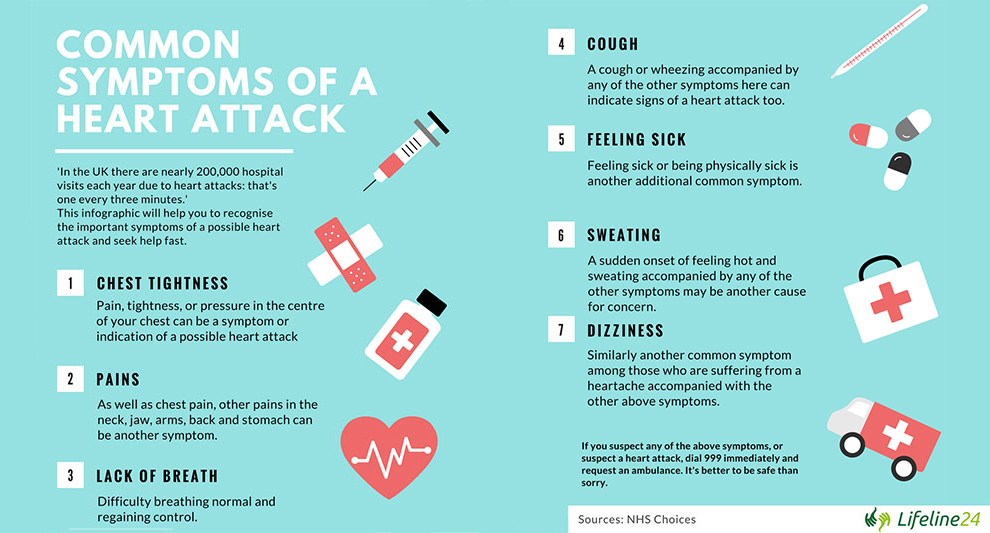Did you know that most deaths from coronary heart disease are caused by a heart attack? Here are some facts about heart attacks:
• In the UK, there are nearly 200,000 hospital visits each year due to heart attacks – that’s one every three minutes.
• In the 1960s, more than seven out of 10 heart attacks in the UK were fatal. Today, at least seven out of 10 people survive.
• An estimated 915,000 people alive in the UK today (640,000 men and 275,000 women) have survived a heart attack (source: BHF)
It is vital that you know the symptoms of a heart attack and that you can call for help immediately. A personal alarm system from LifeConnect24 can provide this service.
Today, we take a quick look at some of the common and less-common symptoms of a heart attack, before going on to explain how we, a personal alarm provider, can help.
What is a Heart Attack?
A heart attack is a serious, and potentially fatal, medical emergency. During a heart attack, the supply of blood to your heart is suddenly blocked – often from a blood clot. A lack of blood can cause serious damage to the heart muscle, so you need to find help immediately.
The Common Symptoms of a Heart Attack
Health professionals and studies say that the most common symptoms of a heart attack, given for both genders, include chest tightness, along with pain in the chest, neck, jaw, arms, or back. A lack of breath, coughing, and feeling sick are also common in both men and woman.
“Although the chest pain is often severe, some people may only experience minor pain, similar to indigestion. In some cases, there may not be any chest pain at all, especially in women, the elderly and people with diabetes. It’s the overall pattern of symptoms that helps to determine whether you are having a heart attack.” (NHS)
Other common signs for men that have been included in symptom reports include dizziness, weakness, and cold sweats. Symptoms common for women include sleep disturbance, anxiety, and indigestion. More common symptoms can be found via the NHS Choices website.
Lesser Known Symptoms of a Heart Attack
There are more symptoms leading to a heart attack than you may realise. Some may come as a surprise. However, it’s important that you are aware of them, as they may be a sign that you are at risk. These lesser known symptoms include:
- Snoring / Sleep Apnoea – This is the name for the periods of time during your sleep when you stop breathing. This is linked to heart disease and can increase the risk of a stroke or heart attack. Snoring can also be a sign of atrial fibrillation – an irregular, often rapid heart rate that causes poor blood flow.
- Bleeding / Sore / Swollen Gums – These symptoms can lead to a serious gum infection called periodontis which destroys the jawbone. This infection can spread around the body and cause inflammation.
- Shoulder / Neck Pains – Many people who have a heart attack feel an uncomfortable sensation, ache, pain, or pressure in their neck, jaw, or shoulders.
- Puffy Legs / Feet – This can be a sign of congestive heart failure. Those who constantly experience this symptom should visit a doctor for an evaluation as soon as possible.
- Indigestion / Heartburn – Though fairly common, they can become dangerous when accompanied with a lack of breath, sweating, or hiccups. People should seek help if this is the case.
- Sexual Dysfunction – This is a common symptom of arterial disease. A build up of plaque in your arteries can lead to the dysfunction of the sexual organs. Post-menopausal women are at increased risk of heart problems.
Even things which you may feel are common or just minor could be signs of poor health in your heart and might require you to be checked out by your GP.
If you think you’re ever suffering from any of the above discussed symptoms, it’s vital to see a doctor as soon as possible to get checked out.
Heart Attack Alarm System
If you are experiencing the symptoms listed above, you could be at increased risk of heart attack. If you are experiencing a heart attack, it may not always be possible to reach a telephone or call for help. Fortunately, this is where our personal alarm system could end up saving your life.
The system comes in two parts: a base unit and a pendant that you choose to wear either around your neck or your wrist, depending on your preference. Your pendant is waterproof, with a range of up to 600m depending on the alarm plan you choose. This means you can even wear it in your garden and still benefit from 24/7 peace of mind. It also has a seven-year battery life. We will even send you a new one free of charge when the battery runs out.
All you need to do if you feel unwell is press the the red button on your pendant – or on the base unit, if accessible. This sends an alert to our 24/7 Response Team, who operate all year round.
A member of the Response Team will try to speak with you over the loudspeaker on the base unit before calling selected family members, friends, or neighbours to come and assist you. These people will be known as your emergency contacts, and will be chosen by you during the purchasing process.
The emergency services will also be contacted on your behalf should you need their assistance. With the red button alarm system, help is just one push of a button away. The speed of this process could end up saving your life.
To order your personal alarm today, or find out more, speak to our team by calling on 0800 030 8999.
Editor’s Note: This article was updated on 15th December 2023 to reflect current information.



